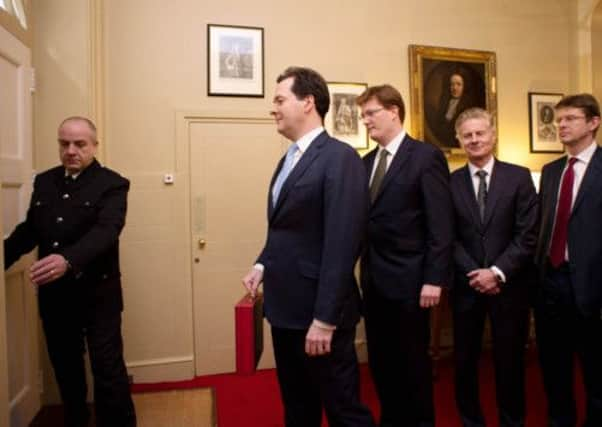Jack Blanchard: Osborne’s aspiration is to show party that he’s an asset and not a liability


Certainly, those scars must run deep.
The now-infamous “omnishambles” of March 2012 did more than just spark endless protests over the Caravan Tax, the Granny Tax, the Pasty Tax, the Charity Tax and all the rest.
It was the Chancellor’s reputation for competence which suffered the biggest blow as his Budget unravelled in the subsequent days and weeks, culminating in a series of humiliating U-turns at the Treasury.
Advertisement
Hide AdAdvertisement
Hide AdAnd it proved only the start of Mr Osborne’s annus horribilis as the economy lurched into a double-dip recession several weeks later. The Chancellor saw himself slip from a potential future Prime Minister to pantomime villain in a few short weeks, being booed by thousands of people when he dared show his face at the Olympic Games.
His party’s poll ratings plummeted along with his own, and eventually even his prized AAA credit rating disappeared as well. So yesterday marked a hugely important moment for Mr Osborne.
Make no mistake – knives were being quietly sharpened. Another Budget failure, Tory backbenchers were whispering, would not – and could not – be tolerated.
Success, on the other hand, could be cathartic for a man once deemed David Cameron’s natural successor at Number Ten.
So did Mr Osborne deliver?
Advertisement
Hide AdAdvertisement
Hide AdCertainly, for a Chancellor with a reputation for extreme caution, a couple of measures unveiled yesterday look genuinely radical – chief among them his new “Help to Buy” scheme.
The scale of the challenge faced by millions of people – particularly the young – to find the sky-high deposit now required to buy a house cannot be under-estimated, and Mr Osborne is absolutely right to pick the issue out as a “blow to aspiration” for so many.
The extraordinary scale of his new scheme, to lend buyers cash for deposits and to under-write mortgages, will make a real difference to an awful lot of people. In a sense, it is an uncharacteristically dramatic intervention by this most hands-off of Chancellors.
But this can equally be seen as precisely the kind of “blue-collar Conservatism” which has been urged upon Mr Osborne and Mr Cameron by their backbenchers, offering tangible help to those seeking to “work hard and get on”.
Advertisement
Hide AdAdvertisement
Hide AdIt is no coincidence that even the name “Help to Buy” so clearly echoes Margaret Thatcher’s popular “Right to Buy scheme of “the 1980s.
But among all the backslapping the Chancellor received at last night’s meeting of the backbench 1922 Committee, one important caveat must be remembered: this measure is hardly without risk. If the property market crashes once again, it is the British public who will find themselves on the hook.
That said, those who have repeatedly called for the Chancellor to take bold action on the economy must accept that sometimes it is necessary to gamble – particularly when the glittering economic prizes on offer are the re-galvanising of the housing market, and the unblocking of stalled new-build schemes up and down the country.
The radical action on mortgages was not the only surprise yesterday. The new “employment allowance” is a significant change and represents a notable victory for this newspaper’s campaign for the existing regional National Insurance “holiday” to be extended and simplified.
Advertisement
Hide AdAdvertisement
Hide AdInstead of a one-year tax breaks for new firms in their first year of existence – one which they had to actively apply for – the new system will automatically slash up to £2,000 from the NI bill of every firm in the country.
This was the Budget’s biggest tax cut, and it is targeted squarely at the small businesses which form the lifeblood of the British economy. In places like North Yorkshire – where the vast majority of firms have only one or two employees – it will surely have an impact. The added investment in infrastructure will be widely welcomed, as will the decision to press ahead with the “clean coal” power station at Drax – a massive project which remains absolutely vital for Yorkshire’s long-term industrial future.
The freeze on fuel duty and the 1p cut on beer taxes were perhaps less of a surprise – crowd-pleasing measures that should secure the Chancellor a favourable headline or two, without making much impact on the wider economy.
The wider economy, of course, is the area where the Chancellor finds himself on less sure footing.
Advertisement
Hide AdAdvertisement
Hide AdThe Labour leader Ed Miliband was vitriolic in the Commons yesterday, brutal in his assessment of Mr Osborne’s failure to meet his own targets on deficit reduction and paying down Britain’s debt.
But the fact Mr Miliband has so far been forced to concentrate his attacks squarely on the latest round of grim economic news will in a sense have been heartening for the Chancellor, who remains confident that a turning point is anyway now being reached.
After all, this time last year his Budget was already starting to unravel, with all the talk focused upon a “tax cut for millionaires” and the “raid on people’s pensions”.
If Mr Osborne can avoid those kinds of headlines, while introducing one or two genuinely radical measures to try to boost growth across the country, he will consider this Budget to have been an important milestone on his personal road to redemption.